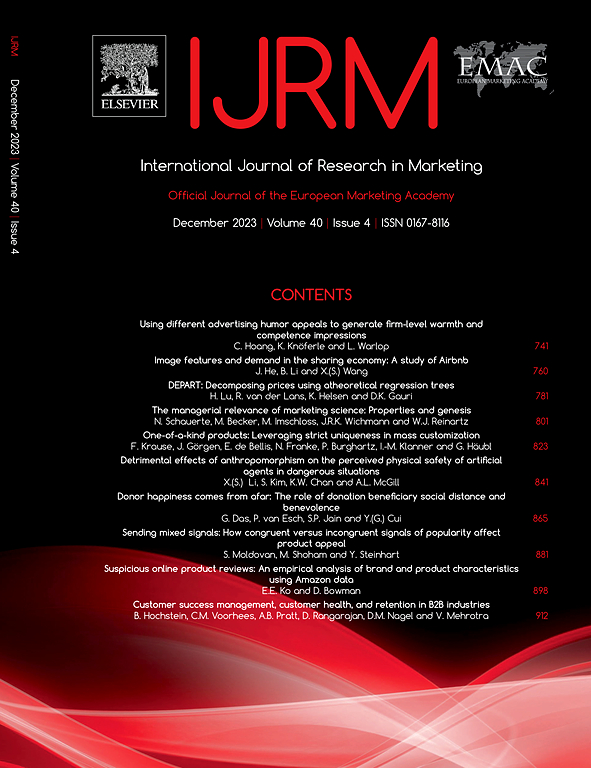Visual complexity, brand gender, and ad effectiveness
IF 7.5
2区 管理学
Q1 BUSINESS
International Journal of Research in Marketing
Pub Date : 2025-06-01
DOI:10.1016/j.ijresmar.2024.09.004
引用次数: 0
Abstract
Visual complexity is an important factor in the design of advertisements. This research systematically examines the interaction effect between an ad’s visual complexity and brand gender on marketing effectiveness in ad practice. Across a series of seven studies, encompassing an Implicit Association Test (IAT), a Facebook field study, a lab experiment with an incentive-compatible design, and four online experiments, the current research demonstrates that consumers respond more favorably to a masculine (versus feminine) brand when presented with a visually simple (versus complex) ad. This symmetric effect is driven by conceptual fluency (i.e., the ease of deriving meanings). That is, a match between masculine (versus feminine) brands and simple (versus complex) ads makes the ad processing more conceptually fluent, which in turn enhances ad effectiveness. Moreover, a boundary condition for the core effect was identified, such that the effect between an ad’s visual complexity and brand gender is attenuated among consumers with an analytic (versus holistic) thinking style when processing ads. This research advances the literature on visual aesthetics, brand perception, and ad effectiveness. Our findings also offer actionable insights to marketing practitioners regarding the strategies of ad design and brand positioning in the marketplace.
视觉复杂性、品牌性别和广告效果
视觉复杂性是广告设计中的一个重要因素。本研究系统考察了广告视觉复杂性与品牌性别对广告营销效果的交互作用。通过一系列的七项研究,包括内隐联想测试(IAT)、Facebook实地研究、激励兼容设计的实验室实验和四项在线实验,目前的研究表明,当呈现在视觉上简单(而不是复杂)的广告时,消费者对男性化(而不是女性化)品牌的反应更积极。这种对称效应是由概念流畅性(即推导意义的便利性)驱动的。也就是说,男性化(与女性化)品牌和简单(与复杂)广告之间的匹配使广告处理在概念上更加流畅,从而提高了广告效果。此外,我们还发现了核心效应的边界条件,即广告的视觉复杂性和品牌性别之间的影响在具有分析(而不是整体)思维风格的消费者处理广告时减弱。本研究推进了视觉美学、品牌感知和广告有效性的文献。我们的研究结果也为市场营销从业者提供了关于广告设计策略和市场品牌定位的可行见解。
本文章由计算机程序翻译,如有差异,请以英文原文为准。
求助全文
约1分钟内获得全文
求助全文
来源期刊
CiteScore
11.80
自引率
4.30%
发文量
77
审稿时长
66 days
期刊介绍:
The International Journal of Research in Marketing is an international, double-blind peer-reviewed journal for marketing academics and practitioners. Building on a great tradition of global marketing scholarship, IJRM aims to contribute substantially to the field of marketing research by providing a high-quality medium for the dissemination of new marketing knowledge and methods. Among IJRM targeted audience are marketing scholars, practitioners (e.g., marketing research and consulting professionals) and other interested groups and individuals.

 求助内容:
求助内容: 应助结果提醒方式:
应助结果提醒方式:


